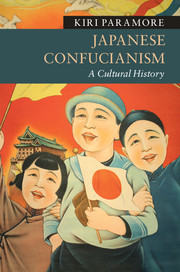Book contents
- Frontmatter
- Epigraph
- Contents
- List of figures
- List of maps
- Acknowledgments
- Notes on the text
- Timeline
- Maps
- Introduction
- 1 Confucianism as cultural capital (mid-first millennium CE–late sixteenth century CE)
- 2 Confucianism as religion (1580s–1720s)
- 3 Confucianism as public sphere (1720s–1868)
- 4 Confucianism as knowledge (1400s–1800s)
- 5 Confucianism as liberalism (1850s–1890s)
- 6 Confucianism as fascism (1868–1945)
- 7 Confucianism as taboo (1945–2015)
- Epilogue: China and Japan: East Asian modernities and Confucian revivals compared
- Notes
- Works Cited
- Index
7 - Confucianism as taboo (1945–2015)
Published online by Cambridge University Press: 05 April 2016
- Frontmatter
- Epigraph
- Contents
- List of figures
- List of maps
- Acknowledgments
- Notes on the text
- Timeline
- Maps
- Introduction
- 1 Confucianism as cultural capital (mid-first millennium CE–late sixteenth century CE)
- 2 Confucianism as religion (1580s–1720s)
- 3 Confucianism as public sphere (1720s–1868)
- 4 Confucianism as knowledge (1400s–1800s)
- 5 Confucianism as liberalism (1850s–1890s)
- 6 Confucianism as fascism (1868–1945)
- 7 Confucianism as taboo (1945–2015)
- Epilogue: China and Japan: East Asian modernities and Confucian revivals compared
- Notes
- Works Cited
- Index
Summary
We resolve to pave the way for a grand peace for all generations to come.
Emperor Hirohito quoting Song Confucian Zhang Zai (1020–1077) during his radio address to the Japanese people announcing surrender (15 August 1945)Postwar Japan was a new country. At least that was the message leaders and intellectuals wanted to give after 1945, and have kept giving ever since (Koizumi 2005). In that new country Confucianism quickly became taboo. Meiji had destroyed Confucian institutions and practice; fascism and World War II destroyed Confucianism's reputation. Associated closely with the fascist politics which had brought about the devastation of the war, it was tainted. The sole social field Confucianism had occupied with influence post-Meiji, ethics teaching in schools, was totally remodeled, with US-originated civics education completely replacing Confucianism. The only place that any Confucianism appeared at all in standard Japanese education post-1945 was a couple of passages of Confucius Analects used for grammar teaching in the small classical Japanese element of the high school language curriculum. There was no structural positioning of Confucianism in general society in any way which would have people reflect on its ethical meaning or history of social and religious practice. The changes to the education system reduced its presence in normal life experience to a couple of sentences from an antique foreign text philologically dissected to understand some finer points of a redundant Japanese grammar. Interest in Confucianism was now restricted to the ivory towers of elite academia, and most of the very limited social impact it had on postwar society was delivered through the mediation of that academic context. Confucianism's limited influence in postwar Japanese society was thus delivered top-down through the ideas of academics who functioned as public intellectuals.
The immediate postwar period saw the meteoric rise of some public intellectuals and high-profile academics whose work used Confucianism centrally. This chapter will thus begin by looking at Maruyama Masao (1914–1996) and Tsuda Sōkichi (1873–1961), two contrasting examples of public intellectuals who influenced the public life of immediately postwar Japan. I will both contrast their influence with more fanatic vestiges of the prewar formulations of Confucianism, for instance in the actions of Mishima Yukio (1925–1970), and also look at the influence of figures like Maruyama and Tsuda on the more sustained but cloistered academic study of Confucianism which continued through the late twentieth century.
- Type
- Chapter
- Information
- Japanese ConfucianismA Cultural History, pp. 167 - 182Publisher: Cambridge University PressPrint publication year: 2016

